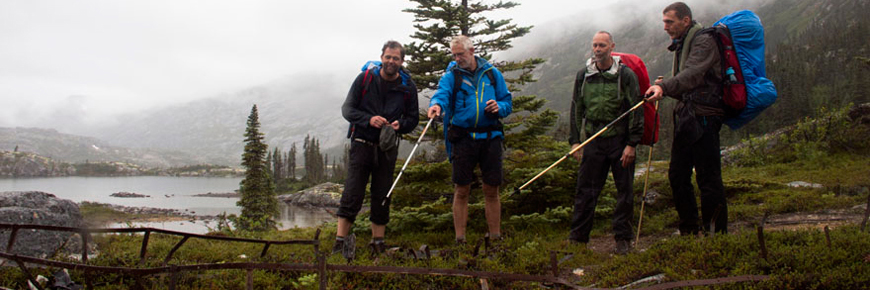
Permit conditions
Chilkoot Trail National Historic Site
-
1. Do not remove or disturb cultural resources
Destroying, damaging, collecting or removing cultural or natural resources is an offence under US and Canadian national park regulations:
- Do not handle artefacts: bottles, cans, boots and other “stuff”
- Stay on the trail and paths in campgrounds to reduce trampling of cultural landscape features such as terraces, foundations and rockwork.
- Do not move rocks around in campgrounds or use them to anchor your tent. Rocks are often the remnants of Gold Rush era structures.
- Do not collect, move or remove any natural resources such as plants, animals and rocks. Note: Berry picking for immediate consumption is permitted on the U.S. side of the trail. Berry picking is not permitted on the Canadian side.
-
2. Do not disturb, feed or entice wildlife
Do not leave packs unattended.
- When stopping, keep your packs together and ensure someone always keeps them within arm’s reach.
Use food/garbage storage devices.- Immediately upon arrival in camp, i.e. before selecting your tent site, securely stow all attractants including: food, trash, fuel, stove, pots, dishes, utensils, toiletries and first aid kit.
- Food storage lockers, or “bear boxes”, are provided at each campground. Ensure the door is securely latched.
For details on food handling protocols, visit Bear safety. -
3. Do not pollute
- Pack out all garbage/food waste.
- Use grey water pits where provided.
For details on waste disposal, visit Water and waste. -
4. Cook and eat only in designated areas
- Designated areas are cooking shelters and picnic tables.
- Do not cook or eat at tent platforms.
- Never bring food or other attractants to a tent site.
-
5. Camp only in designated campsites
- No camping in shelters
- Carry cord to help secure tents to platforms
- Do not use stones or cobbles to secure tents because they may belong to historic building foundations
-
6. No campfires
Open fires are prohibited on the Chilkoot Trail. Bring your own backpacking stove and fuel for cooking. There are wood stoves in most shelters below the treeline, but wood supplies may be scarce and/or wet.
On the US portion of the trail:
- Collect “down and dead” wood only
- Do not cut live or standing trees for firewood
On the Canadian portion of the trail:- Firewood is provided
- Collecting wood is prohibited. If there is no firewood check with staff at the Lindeman Warden Station.
-
7. Pets must be on a leash at all times
We recommend you do not take your pets on the trail. However, if you choose to do so:
- Pets must be kept on a leash at all times
- Pets are not allowed in cooking shelters
- Do not take pet food to your campsite or leave it unattended: store it in the bear boxes with your food and other attractants
- Clean up after your pet; dispose of pet feces in the outhouses
-
8. Fishing is restricted
- An Alaska State fishing license is required along the US portion of the trail
- Fishing and fishing gear are prohibited on the Canadian portion of the trail
-
9. Metal detectors, firearms and mountain bikes are restricted
- Metal detectors, firearms and mountain bikes are prohibited on the Canadian portion of the Chilkoot Trail.
-
10. A business license is required for guided groups
- Commercial operators require business licenses to operate on the Chilkoot Trail
- Organized institutional or non-profit groups may also require business licenses
Contact Parks Canada and the U.S. National Park Service for business license requirements.
- Date modified :